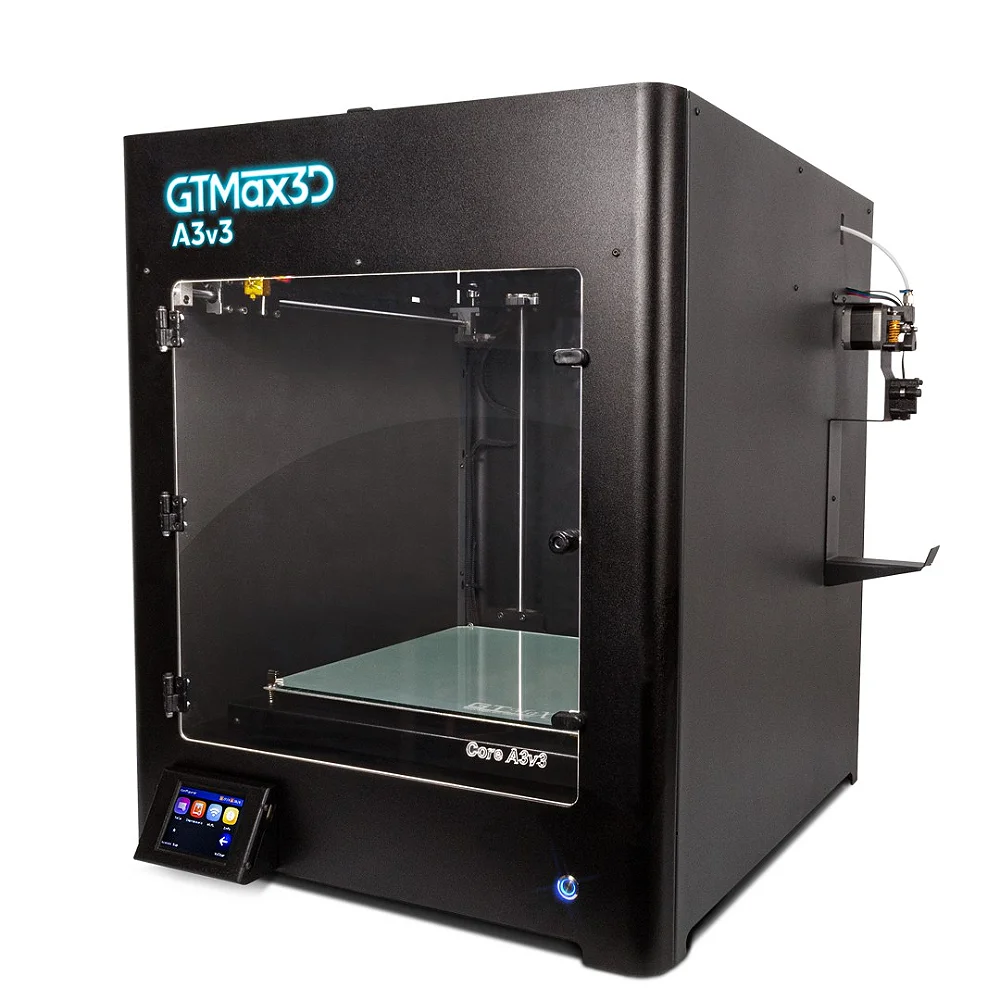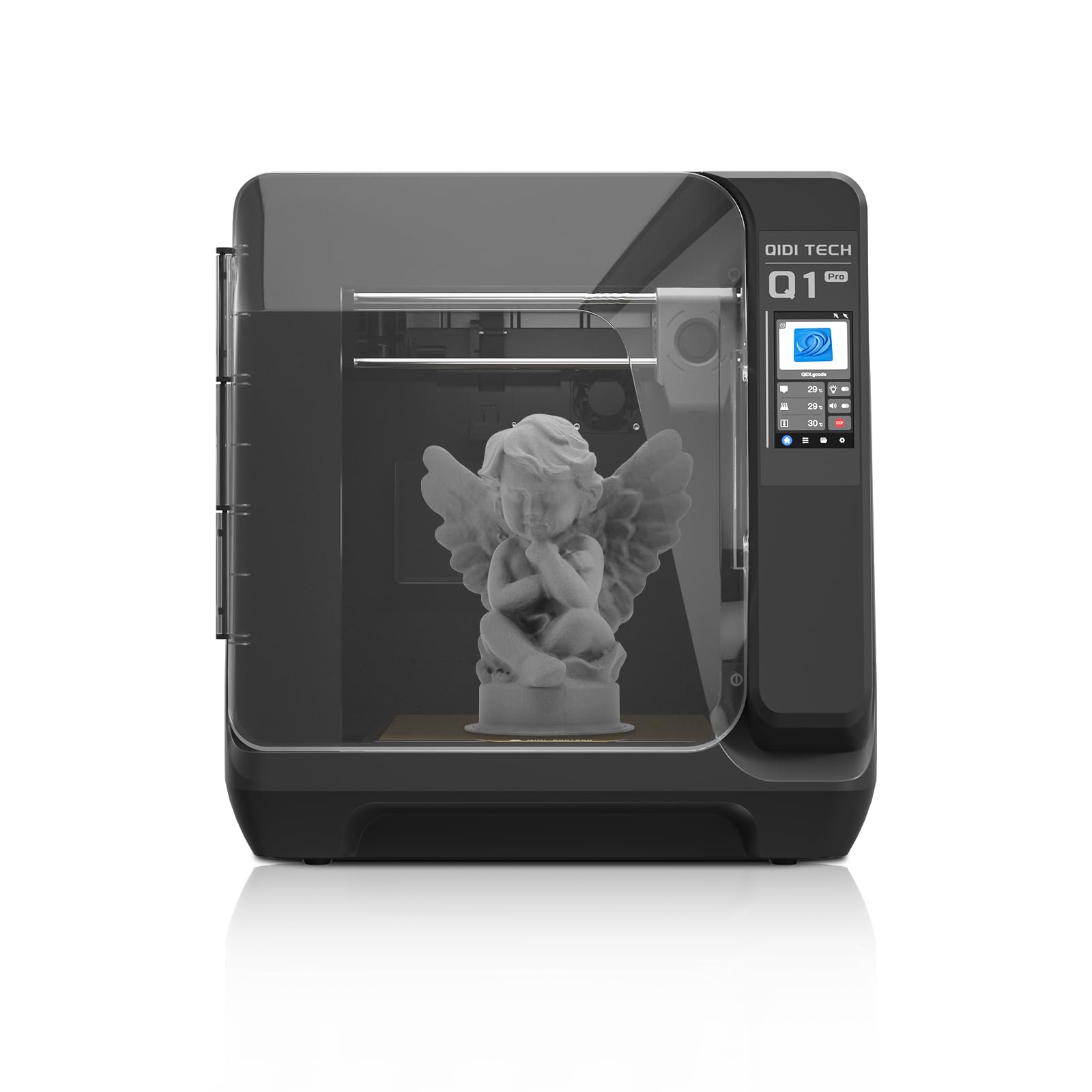Compare A3V3 vs Q1 PRO
Comparison between the best 3D printers
Choose the best 3D printer at the best price. The cheapest 3D printers are here.
Buy a 3D printer here with 3D Fila.
 |
 |
|
| Model | A3V3 |
Q1 PRO[BUY Q1 PRO] |
| Printing Material | Filament | Filament |
| Buy Filament for GTMax A3V3 | Buy Filament forQIDI Q1 PRO | |
| Estimated price | $1210,00 | $449,00 |
| Manufacturer | GTMax | QIDI |
| Release Year | 2022 | 2024 |
| Print Volume [mm] | 320x320x340 | 245x245x245 |
| Printer Size [mm] | 640x580x630 | 467x477x489 |
| Weight [kg] | 20 | |
| Power Loss Recovery | YES | YES |
| Enclosed printer | YES | YES |
| Bed Leveling | Automatic | Automatic |
| Filament End Sensor | YES | YES |
| Bed type | Heated | Heated |
| Power supply system | Bowden | Direct Drive |
| Standard nozzle | 0,4 | 0,4 |
| Maximum Nozzle Temperature [°C] | 295 | 350 |
| Maximum Bed Temperature [°C] | 120 | |
| Maximum printing speed [mm/s] | 180 | 600 |
| Filament holder | YES | YES |
| Camera for supervision | NO | NO |
| Recommended filaments | PLA, PETG | PLA、ABS、ASA、PETG、TPU、PC、PA、PA-CF、PET-CF、PAHT-CF etc. |
| Recommended slicers | Cura, Simplify, Slic3r, IdeaMaker e outros | QIDI Slicer/Cura/Simplify 3D/ORCA/PRUSA Slicer |
| Maximum Resolution [mm] | 0,05 | 0,1 |
| Processor | Cortex-A53,64-bit Processor | |
| Display | Display touchscreen 3,2'' | Touchscreen 4,3'' |
| Power Supply | 350 W | |
| Connectivity | SD / USB / Wi-Fi | WiFi/USB Flash Drive/Ethernet Cable |
| Operating systems | Windows, Mac, Linux | Windows, Linux, Macbook |
| Date of registration in the system | 2022-11-12 | 2024-07-09 |
| Release date | 2022 | 2024 |
| Extra features | The PROCORE A3v3 is an advanced 3D printer with a robust structure and Wi-Fi connectivity. It stands out for its aluminum extruder with Dual Gear system for precision and traction, and a movement system with machined parts. It includes a 3.2-inch LCD Touchscreen Display, Wi-Fi remote control and a Core XY movement system for greater speed and precision. It offers an Allmetal Volcano hotend that reaches up to 295°C, is compatible with various filaments and has an energy saving system, reducing consumption by up to 75%. | The QIDI Q1 Pro 3D printer stands out for its Core XY structure and heating chambers that reach up to 60ºC, ideal for advanced materials such as ABS and Nylon. It features Klipper firmware, an automatic leveling system, a high-flow extruder with a double metal nozzle and a hotend that reaches 350ºC. It offers connectivity via Wi-Fi, USB and Ethernet, as well as a 1080p camera for remote monitoring and an intuitive touchscreen for easy operation. |
| Support for multiple colors and materials (AMS and CFS) | NO | NO |
Notes * |
||
| Cost-benefit | 6 / 10 | 8 / 10 |
| Hardware | 3 / 10 | 4.8 / 10 |
| Tela | . | . |
| Print volume | 4 / 10 | 3 / 10 |
| Performance | 1 / 10 | 5 / 10 |
| [BUY Q1 PRO] |
Conclusion |
| In comparing the GTMax A3V3 and QIDI Q1 PRO 3D printers, several key aspects emerge that can help potential buyers make an informed decision. The GTMax A3V3 offers a larger print volume, making it suitable for larger projects. Its robust build and advanced features like a Dual Gear system and energy-saving capabilities are commendable. However, its higher price point may deter budget-conscious users. While it does provide greater stability in high-temperature settings, some users may find this model somewhat limited in the types of filaments it can effectively use. On the other hand, the QIDI Q1 PRO, while more affordable, boasts impressive specifications such as a higher maximum nozzle temperature and faster printing capabilities. Its support for a broader range of advanced materials, including ABS and Nylon, enhances its versatility. Additionally, features like Klipper firmware and an intuitive interface improve the user experience. Despite its smaller print volume, the overall performance and cost-effectiveness make it an appealing option for users who prioritize functionality over size. In conclusion, while the A3V3 may appeal to those needing a larger printing space and robust build quality, the QIDI Q1 PRO stands out for its versatility, advanced features, and better overall value. Buyers should consider their specific needs and desired features, alongside budget constraints, when choosing between these two models. |

